Learning Microsoft Azure, a comprehensive cloud computing platform, is a journey, not a sprint. The time it takes to achieve proficiency depends on various factors, including your prior experience, learning style, desired skill level, and the specific Azure services you want to master. This article explores the different learning paths and resources available to help you estimate how long it will take to learn Azure.
Factors Influencing Azure Learning Time
Several key factors determine how long it takes to learn Microsoft Azure:
- Prior Experience: Individuals with a background in IT, networking, or development will likely grasp Azure concepts faster than those with no prior technical experience. Familiarity with cloud computing principles is also advantageous.
- Learning Style: Some learners prefer self-paced online courses, while others thrive in instructor-led classroom settings. Identifying your preferred learning style and choosing appropriate resources can significantly impact learning time.
- Desired Skill Level: Are you aiming for a foundational understanding or aspiring to become an Azure expert? Mastering specific Azure services for specialized roles, like a Solutions Architect or DevOps Engineer, requires more in-depth study.
- Learning Resources: Utilizing high-quality learning materials, such as Microsoft’s official documentation, learning paths, and hands-on labs, can accelerate the learning process.
Microsoft’s 30 Days to Learn It Challenge: A Jumpstart to Azure
Microsoft offers the “30 Days to Learn It” program, a structured learning challenge designed to fast-track your Azure skills development. While not a complete mastery program, it provides a solid foundation in various Azure areas within a month.
This challenge includes curated learning paths for different roles and skill levels, including:
| Role/Skill | Description |
|---|---|
| Azure Network Engineer | Learn to plan, implement, and maintain Azure networking solutions. |
| Azure Database Administrator | Explore managing cloud-native and hybrid data platform solutions. |
| Windows Server Hybrid Admin | Develop skills in configuring and managing Windows Server in on-premises, hybrid, and cloud environments. |
| Azure Virtual Desktop Fundamentals | Learn to plan, manage, and maintain Azure Virtual Desktop deployments. |
| Azure AI Fundamentals | Get a foundational understanding of machine learning and AI concepts in Azure. |
| Azure Developer | Participate in all phases of cloud development, designing, building, testing, and maintaining cloud applications. |
| Azure Data Scientist | Design and implement data science solutions, building machine learning models and running data science workloads in Azure. |
| Azure Data Fundamentals | Learn core database concepts in cloud environments, including relational, non-relational, big data, and analytics. |
| Azure Cosmos DB Developer | Develop modern applications with Azure Cosmos DB, a fully managed NoSQL database. |
| Designing Azure Infrastructure Solutions | Learn to design cloud and hybrid solutions encompassing compute, network, storage, monitoring, and security. |
| Java on Azure Developer | Develop modern Java applications in Azure using managed compute, databases, and DevOps services. |
| DevOps Engineer | Design and implement DevOps processes, including instrumentation, source control, automation, and deployment. |
| Azure Synapse Analytics | Advance your data analytics skills with Azure Synapse Analytics, integrating and transforming data for building analytics solutions. |
Beyond 30 Days: The Path to Azure Mastery
Completing the 30 Days to Learn It challenge is just the beginning. Continued learning through hands-on practice, real-world projects, and advanced certifications is crucial for long-term Azure mastery.
Consider these ongoing learning avenues:
- Microsoft Learn: Explore in-depth learning paths, tutorials, and hands-on labs covering various Azure services.
- Azure Certifications: Pursuing role-based certifications validates your skills and demonstrates your expertise to potential employers.
- Community Resources: Engage with the Azure community through forums, blogs, and user groups to learn from others’ experiences and stay updated on the latest developments.
Conclusion: A Continuous Learning Journey
Learning Microsoft Azure is an ongoing process. While the 30 Days to Learn It program provides a valuable starting point, continuous learning and practical experience are essential for achieving true proficiency. Embrace the journey, utilize available resources, and tailor your learning path to your specific goals and aspirations. The time investment will be well worth the reward as you unlock the power of Azure.

